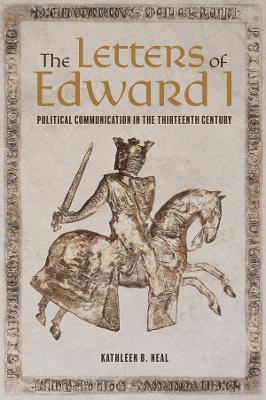
The Letters of Edward I
Political Communication in the Thirteenth Century
Seiten
2021
The Boydell Press (Verlag)
978-1-78327-415-4 (ISBN)
The Boydell Press (Verlag)
978-1-78327-415-4 (ISBN)
Detailed examination of the letters of Edward I reveals them to be powerful and sophisticated political tools.
Highly commended for the Royal Studies Journal Book Prize, 2022
As formulaic in appearance as they are abundant in the archives, it is easy to underestimate the power of the letters generated by medieval governments, but these acts of communication were more than mere containers of information. Operating at the intersection of the spoken and the written, the performed and the observed, they produced a discourse that maximized royal authority and promoted solidarity between sender and recipient.
This book situates letters within medieval theories of composition and habits of reception, to argue that even mundane letters of governance were rhetorical texts. It focuses on the example of Edward I of England, whose rhetorical prowess was noted, often critically, by contemporaries. It shows how the king's correspondence varied in tone, vocabulary and structure across his reign and between recipients, revealing an unexpected dynamism of political discourse. Moving between historical context and close readings of individual letters, this volume identifies letter-writing as an art through which the king and his government attempted to negotiate and mould relationships with political communities and diplomatic interlocutors alike.
Highly commended for the Royal Studies Journal Book Prize, 2022
As formulaic in appearance as they are abundant in the archives, it is easy to underestimate the power of the letters generated by medieval governments, but these acts of communication were more than mere containers of information. Operating at the intersection of the spoken and the written, the performed and the observed, they produced a discourse that maximized royal authority and promoted solidarity between sender and recipient.
This book situates letters within medieval theories of composition and habits of reception, to argue that even mundane letters of governance were rhetorical texts. It focuses on the example of Edward I of England, whose rhetorical prowess was noted, often critically, by contemporaries. It shows how the king's correspondence varied in tone, vocabulary and structure across his reign and between recipients, revealing an unexpected dynamism of political discourse. Moving between historical context and close readings of individual letters, this volume identifies letter-writing as an art through which the king and his government attempted to negotiate and mould relationships with political communities and diplomatic interlocutors alike.
KATHLEEN B. NEAL is Lecturer in History at Monash University.
Introduction: Letters and the Language of Power
Royal Letters: The Authority of a Form
Rhetorical Refinement: Epistolary Editing and its Implications
Announcing the Message: Communities of Reception and Royal Ideology
'Dear Cousin': Affect and Epistolarity Beyond Borders
Keeping Friends Close: Strategies of Epistolary Alignment
Rhetoric Under Strain: Re-writing Royal Epistolarity
Conclusion. Royal Epistolarity: The Voice of the King
Appendix
Bibliography
Index
| Erscheinungsdatum | 26.01.2021 |
|---|---|
| Zusatzinfo | 2 b/w, 1 line illus. |
| Verlagsort | Woodbridge |
| Sprache | englisch |
| Maße | 156 x 234 mm |
| Themenwelt | Geisteswissenschaften ► Archäologie |
| Geschichte ► Allgemeine Geschichte ► Mittelalter | |
| Geisteswissenschaften ► Geschichte ► Regional- / Ländergeschichte | |
| ISBN-10 | 1-78327-415-8 / 1783274158 |
| ISBN-13 | 978-1-78327-415-4 / 9781783274154 |
| Zustand | Neuware |
| Haben Sie eine Frage zum Produkt? |
Mehr entdecken
aus dem Bereich
aus dem Bereich
eine neue Geschichte des Mittelalters
Buch | Hardcover (2023)
C.H.Beck (Verlag)
38,00 €


